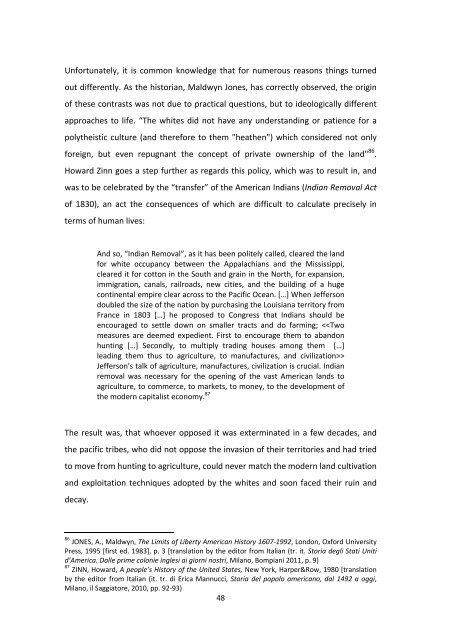building the american landscape - Univerza v Novi Gorici
building the american landscape - Univerza v Novi Gorici
building the american landscape - Univerza v Novi Gorici
You also want an ePaper? Increase the reach of your titles
YUMPU automatically turns print PDFs into web optimized ePapers that Google loves.
Unfortunately, it is common knowledge that for numerous reasons things turned<br />
out differently. As <strong>the</strong> historian, Maldwyn Jones, has correctly observed, <strong>the</strong> origin<br />
of <strong>the</strong>se contrasts was not due to practical questions, but to ideologically different<br />
approaches to life. “The whites did not have any understanding or patience for a<br />
poly<strong>the</strong>istic culture (and <strong>the</strong>refore to <strong>the</strong>m "hea<strong>the</strong>n") which considered not only<br />
foreign, but even repugnant <strong>the</strong> concept of private ownership of <strong>the</strong> land" 86 .<br />
Howard Zinn goes a step fur<strong>the</strong>r as regards this policy, which was to result in, and<br />
was to be celebrated by <strong>the</strong> “transfer” of <strong>the</strong> American Indians (Indian Removal Act<br />
of 1830), an act <strong>the</strong> consequences of which are difficult to calculate precisely in<br />
terms of human lives:<br />
And so, “Indian Removal”, as it has been politely called, cleared <strong>the</strong> land<br />
for white occupancy between <strong>the</strong> Appalachians and <strong>the</strong> Mississippi,<br />
cleared it for cotton in <strong>the</strong> South and grain in <strong>the</strong> North, for expansion,<br />
immigration, canals, railroads, new cities, and <strong>the</strong> <strong>building</strong> of a huge<br />
continental empire clear across to <strong>the</strong> Pacific Ocean. […] When Jefferson<br />
doubled <strong>the</strong> size of <strong>the</strong> nation by purchasing <strong>the</strong> Louisiana territory from<br />
France in 1803 […] he proposed to Congress that Indians should be<br />
encouraged to settle down on smaller tracts and do farming; <br />
Jefferson's talk of agriculture, manufactures, civilization is crucial. Indian<br />
removal was necessary for <strong>the</strong> opening of <strong>the</strong> vast American lands to<br />
agriculture, to commerce, to markets, to money, to <strong>the</strong> development of<br />
<strong>the</strong> modern capitalist economy. 87<br />
The result was, that whoever opposed it was exterminated in a few decades, and<br />
<strong>the</strong> pacific tribes, who did not oppose <strong>the</strong> invasion of <strong>the</strong>ir territories and had tried<br />
to move from hunting to agriculture, could never match <strong>the</strong> modern land cultivation<br />
and exploitation techniques adopted by <strong>the</strong> whites and soon faced <strong>the</strong>ir ruin and<br />
decay.<br />
86 JONES, A., Maldwyn, The Limits of Liberty American History 1607‐1992, London, Oxford University<br />
Press, 1995 [first ed. 1983], p. 3 [translation by <strong>the</strong> editor from Italian (tr. it. Storia degli Stati Uniti<br />
d’America. Dalle prime colonie inglesi ai giorni nostri, Milano, Bompiani 2011, p. 9)<br />
87 ZINN, Howard, A people’s History of <strong>the</strong> United States, New York, Harper&Row, 1980 [translation<br />
by <strong>the</strong> editor from Italian (it. tr. di Erica Mannucci, Storia del popolo <strong>american</strong>o, dal 1492 a oggi,<br />
Milano, il Saggiatore, 2010, pp. 92‐93)<br />
48
















